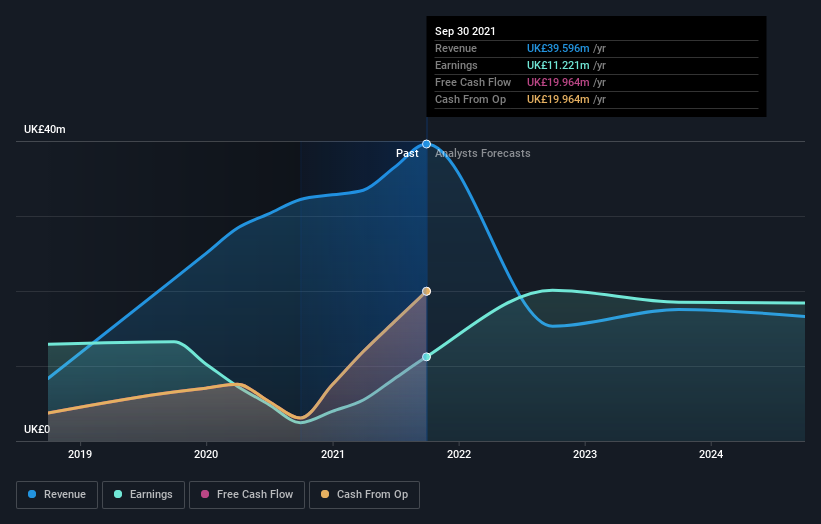- United Kingdom
- /
- Residential REITs
- /
- LSE:RESI
The Residential Secure Income plc (LON:RESI) Analysts Have Been Trimming Their Sales Forecasts

The analysts covering Residential Secure Income plc (LON:RESI) delivered a dose of negativity to shareholders today, by making a substantial revision to their statutory forecasts for this year. This report focused on revenue estimates, and it looks as though the consensus view of the business has become substantially more conservative. At UK£1.03, shares are up 4.0% in the past 7 days. Investors could be forgiven for changing their mind on the business following the downgrade; but it's not clear if the revised forecasts will lead to selling activity.
Following the downgrade, the consensus from dual analysts covering Residential Secure Income is for revenues of UK£15m in 2022, implying a painful 61% decline in sales compared to the last 12 months. Prior to the latest estimates, the analysts were forecasting revenues of UK£18m in 2022. The consensus view seems to have become more pessimistic on Residential Secure Income, noting the measurable cut to revenue estimates in this update.
See our latest analysis for Residential Secure Income

Taking a look at the bigger picture now, one of the ways we can understand these forecasts is to see how they compare to both past performance and industry growth estimates. These estimates imply that sales are expected to slow, with a forecast annualised revenue decline of 61% by the end of 2022. This indicates a significant reduction from annual growth of 33% over the last three years. By contrast, our data suggests that other companies (with analyst coverage) in the same industry are forecast to see their revenue grow 6.7% annually for the foreseeable future. So although its revenues are forecast to shrink, this cloud does not come with a silver lining - Residential Secure Income is expected to lag the wider industry.
The Bottom Line
The most important thing to take away is that analysts cut their revenue estimates for this year. They also expect company revenue to perform worse than the wider market. Given the stark change in sentiment, we'd understand if investors became more cautious on Residential Secure Income after today.
Looking for more information? We have estimates for Residential Secure Income from its dual analysts out until 2024, and you can see them free on our platform here.
Of course, seeing company management invest large sums of money in a stock can be just as useful as knowing whether analysts are downgrading their estimates. So you may also wish to search this free list of stocks that insiders are buying.
New: AI Stock Screener & Alerts
Our new AI Stock Screener scans the market every day to uncover opportunities.
• Dividend Powerhouses (3%+ Yield)
• Undervalued Small Caps with Insider Buying
• High growth Tech and AI Companies
Or build your own from over 50 metrics.
Have feedback on this article? Concerned about the content? Get in touch with us directly. Alternatively, email editorial-team (at) simplywallst.com.
This article by Simply Wall St is general in nature. We provide commentary based on historical data and analyst forecasts only using an unbiased methodology and our articles are not intended to be financial advice. It does not constitute a recommendation to buy or sell any stock, and does not take account of your objectives, or your financial situation. We aim to bring you long-term focused analysis driven by fundamental data. Note that our analysis may not factor in the latest price-sensitive company announcements or qualitative material. Simply Wall St has no position in any stocks mentioned.
About LSE:RESI
Residential Secure Income
Residential Secure Income plc (LSE: RESI) is a real estate investment trust (REIT) focused on delivering secure, inflation-linked returns with a focus on two resident sub-sectors in UK residential - independent retirement rentals and shared ownership - underpinned by an ageing demographic and untapped and strong demand for affordable homeownership.
Good value average dividend payer.
Market Insights
Community Narratives




